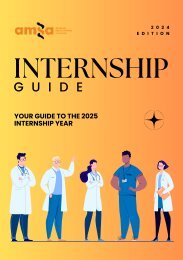Vector Volume 11 Issue 1 - 2017
You also want an ePaper? Increase the reach of your titles
YUMPU automatically turns print PDFs into web optimized ePapers that Google loves.
Yes, we are a large part of the cause. But if<br />
I learned anything over the weekend, it is that<br />
we can also drive the solution. In the words of<br />
Dr Helen Szoke, “the mission that you sign up<br />
to when you become a doctor means that you<br />
have a responsibility to assist humanity climate<br />
change is a big part of that.” There needs to be<br />
a shift of focus from the negative outcomes of<br />
climate change, towards the positive ways we<br />
as doctors, we have an obligation to talk and<br />
act on climate change”.<br />
Photo credit<br />
Mack Lee<br />
Acknowledgements<br />
None<br />
Conflict of Interest<br />
None declared<br />
Correspondence<br />
isobelle.woodruff@amsa.org.au<br />
References<br />
iDEA17 delegates<br />
can address it. We need to stop seeing it as<br />
an issue and start seeing it as a potential for<br />
change and act in the infinite ways the speakers<br />
outlined at iDEA. While it is the biggest threat to<br />
our species and planet, climate change could<br />
also be “the greatest global health opportunity<br />
of the 21st century”.[8]<br />
The evening before the conference<br />
commenced, I was honored to hear from human<br />
rights lawyer Julian Burnside AO QC, who<br />
eloquently stated; “to remain silent is as much<br />
a political act as to speak out”. This simple idea<br />
is as applicable to climate change and human<br />
health as ever; the health impacts of climate<br />
change are direct and indirect, immediate and<br />
long term, both overt and subtle. We must have<br />
a global perspective on the issue, but also the<br />
willingness to act locally to create sustainable<br />
and tangible change to protect the health of our<br />
planet and our people. It is our responsibility as<br />
informed, ethically-minded health professionals<br />
to act now. In the words of Dr Stephen Parnis, ex-<br />
AMA Vice President “prevention and mitigation<br />
is always better than reaction and recovery –<br />
1. Doctors for the Environment Australia. iDEA17 Conference<br />
DEA<strong>2017</strong> [Available from: https://www.dea.org.au/<br />
idea<strong>2017</strong>/.<br />
2. The Lancet. A Commission on climate change. The<br />
Lancet. 2009;373(9676):1659.<br />
3. Inheriting a sustainable world? Atlas on children’s<br />
health and the environment. Geneva: World Health<br />
Organisation, <strong>2017</strong>.<br />
4. Food and Agriculture Organization of the United<br />
Nations. Food wastage footprint; impacts on natural<br />
resources (summary report). Natural Resources<br />
Management and Environment Department, United<br />
Nations, 2013.<br />
5. Buckley T. IEEFA Update: China Is Now Three Years<br />
Past Coal. IEEFA, <strong>2017</strong> Feburary 28, <strong>2017</strong>. Report No.<br />
6. Tan JAMH. Economics: Manufacture renewables to<br />
build energy security. Nature. 2014;513(7517).<br />
7. McMichael AJ. Globalization, Climate Change, and<br />
Human Health. The New England Journal of Medicine.<br />
2013;386:1335-43.<br />
8. Nick Watts et al. Health and climate change:<br />
policy responses to protect public health. The Lancet.<br />
2015;386(10006):1861 - 914.<br />
49

















